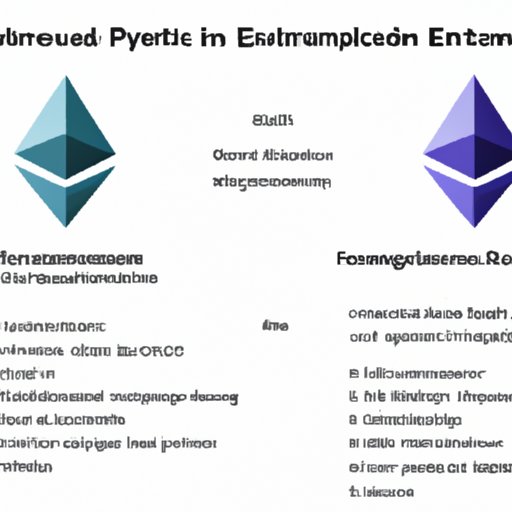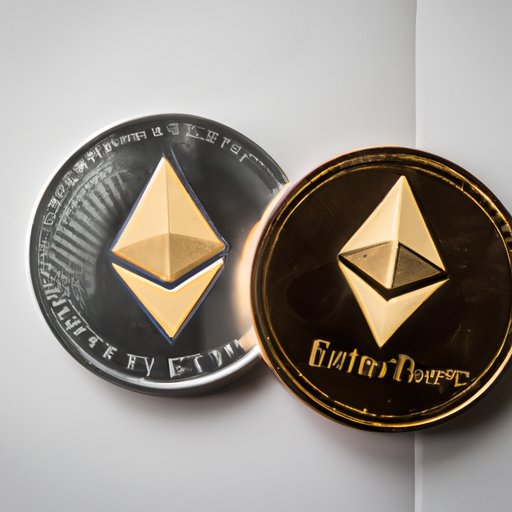Introduction
Wrapped Ethereum (WETH) is a form of cryptocurrency that has become increasingly popular in the world of decentralized finance (DeFi). In this article, we will explore what Wrapped Ethereum is, how it works, the benefits of wrapping Ether for DeFi projects, the different wrapped Ethereum protocols, the risks associated with Wrapped Ethereum, and the potential of Wrapped Ethereum in the future.
What is Wrapped Ethereum?
Wrapped Ethereum (WETH) is an ERC-20 token that allows users to wrap Ether (ETH) into a tradeable asset. It essentially functions as a bridge between Ethereum and other blockchains, allowing users to take advantage of the benefits of both. By wrapping Ether into a tradeable asset, users can access DeFi projects, improve liquidity, and gain access to new markets.
How Does it Work?
In order to wrap Ether, users must first deposit ETH into a smart contract. They will then receive an equivalent amount of Wrapped ETH (WETH) tokens in return. This process is known as “wrapping” or “converting” ETH into WETH. The reverse process, known as “unwrapping” or “unconverting” WETH back into ETH, is also possible. This allows users to quickly and easily convert back and forth between ETH and WETH.
The Benefits of Wrapping Ether for DeFi Projects
Wrapping Ether offers a range of benefits to users who are looking to get involved in DeFi projects. These include:
Improved Liquidity
One of the main advantages of wrapping Ether is that it improves liquidity. By wrapping Ether into a tradeable asset, users are able to more easily move their funds across different blockchains and platforms. This makes it much easier for users to access DeFi projects, as well as other decentralized services, without having to worry about liquidity constraints.
Easier Accessibility to Decentralized Finance (DeFi)
Wrapped Ethereum also makes it easier for users to access DeFi projects. By wrapping Ether, users can take advantage of the benefits of DeFi while still maintaining control over their funds. This means that users can access DeFi projects without having to trust third parties with their funds.
Access to New Markets
Wrapping Ether also gives users access to new markets. By wrapping Ether, users can access a range of decentralized services and platforms that were previously inaccessible. This opens up a wealth of new opportunities for users who are looking to explore the world of DeFi.
Improved Security
Finally, wrapping Ether also offers improved security. By wrapping Ether, users are able to benefit from the added layer of security provided by the blockchain. This means that users’ funds are protected from malicious actors and hackers, making it much safer for them to access DeFi projects.

Exploring the Different Wrapped Ethereum Protocols
There are currently three main Wrapped Ethereum protocols: WETH, DAI, and USDC. Each of these protocols offers different benefits and features, so it is important to understand the differences between them before deciding which one is right for you.
WETH
WETH is the original Wrapped Ethereum protocol. It allows users to wrap Ether into a tradeable asset and access DeFi projects. It is the most widely used protocol, and is supported by a wide range of DeFi projects.
DAI
DAI is a stablecoin that is backed by multiple currencies. It is designed to be a stable alternative to traditional fiat currencies, and is often used for payments and trading. It is also supported by a wide range of DeFi projects.
USDC
USDC is a stablecoin that is backed by the US Dollar. It is designed to offer users a safe and reliable way to store their money, as well as to facilitate transactions on the Ethereum blockchain. USDC is supported by a wide range of DeFi projects.
Understanding the Risks of Wrapped Ethereum
While Wrapped Ethereum offers a range of benefits, there are also some risks associated with it. These include:
Counterparty Risk
One of the main risks associated with Wrapped Ethereum is counterparty risk. This is the risk that the other party in a transaction may not fulfill their obligations. This risk is inherent in any type of financial transaction, and it is important to consider when using Wrapped Ethereum.
Volatility Risk
Another risk associated with Wrapped Ethereum is volatility risk. This is the risk that the value of the asset may fluctuate significantly over time. This risk is particularly relevant for those who are trading Wrapped Ethereum, as it can lead to large losses if the asset suddenly drops in value.
Regulatory Risk
Finally, it is important to consider the regulatory risk associated with Wrapped Ethereum. As the use of cryptocurrencies is still a relatively new phenomenon, regulations are constantly changing. As such, it is important to keep up to date with the latest regulations in order to ensure that you remain compliant.

Comparing Wrapped Ethereum to Fiat Currencies
Wrapped Ethereum and fiat currencies have a number of similarities and differences. It is important to understand these in order to decide which is the best option for you.
Advantages of Wrapped Ethereum Over Fiat Currencies
The main advantage of Wrapped Ethereum over fiat currencies is that it is decentralized. This means that it is not subject to the same level of manipulation or control from governments or banks. Additionally, Wrapped Ethereum is much more secure than fiat currencies, as it is protected by the blockchain. Finally, Wrapped Ethereum is much more efficient than fiat currencies, as transactions can be completed almost instantly.
Disadvantages of Wrapped Ethereum Compared to Fiat Currencies
The main disadvantage of Wrapped Ethereum compared to fiat currencies is that it is much more volatile. This means that its value can fluctuate significantly over time, which can lead to large losses. Additionally, Wrapped Ethereum is not yet as widely accepted as fiat currencies, so it may be difficult to use it for everyday purchases. Finally, Wrapped Ethereum is not backed by any physical assets, so its value is entirely dependent on market forces.

Exploring the Potential of Wrapped Ethereum in the Future
As Wrapped Ethereum continues to grow in popularity, it is important to consider its potential applications in the future. Here are some of the potential uses of Wrapped Ethereum:
The Growing Popularity of DeFi
As the popularity of DeFi projects continues to grow, Wrapped Ethereum is likely to become increasingly important. By wrapping Ether, users can access a range of DeFi projects, improving liquidity and giving them access to new markets.
Increasing Adoption of Wrapped Ethereum
As more people begin to use Wrapped Ethereum, its adoption is likely to continue to increase. This could lead to more projects being built on top of the Ethereum blockchain, as well as more services being offered by existing projects.
Potential Applications of Wrapped Ethereum
Finally, Wrapped Ethereum could potentially be used for a range of applications. These could include payment systems, lending platforms, and even prediction markets. The possibilities are endless, and as Wrapped Ethereum continues to gain traction, these applications are likely to become more common.
Conclusion
Wrapped Ethereum is a form of cryptocurrency that allows users to wrap Ether into a tradeable asset. It offers a range of benefits, including improved liquidity, easier accessibility to DeFi projects, access to new markets, and improved security. There are also some risks associated with Wrapped Ethereum, such as counterparty risk, volatility risk, and regulatory risk. Finally, Wrapped Ethereum has the potential to be used for a range of applications in the future, as its popularity continues to grow.
(Note: Is this article not meeting your expectations? Do you have knowledge or insights to share? Unlock new opportunities and expand your reach by joining our authors team. Click Registration to join us and share your expertise with our readers.)
